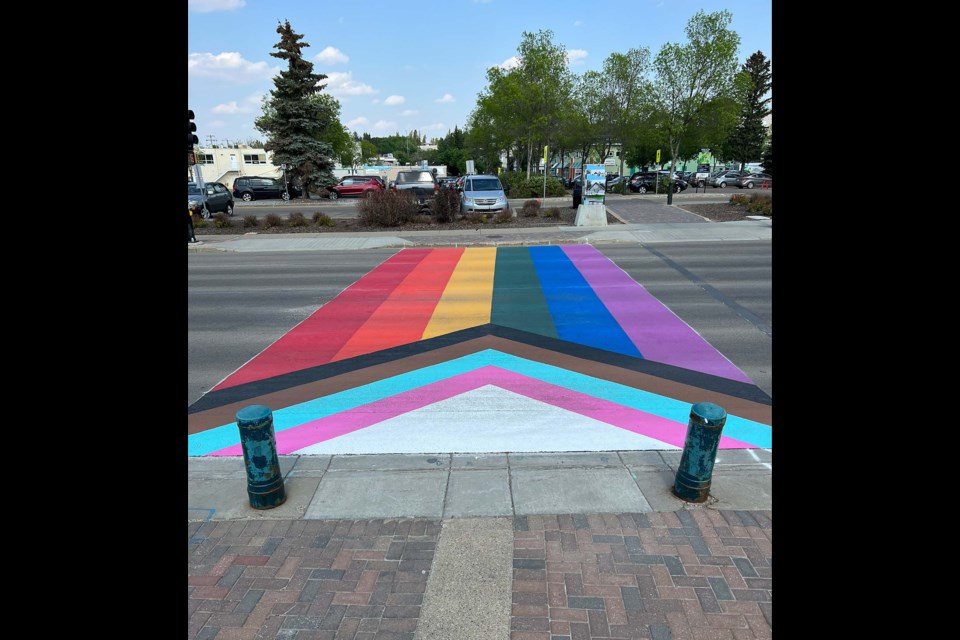Heated protests and counter protests concerning parental rights, children’s rights, and LGBTQIA2S+ issues took place across Alberta on Wednesday.
On Sept. 20, 1 Million March for Children held marches in various cities across Canada in protest of what the group is calling SOGI — sexual orientation and gender identity — in schools.
On its website, the group says it advocates for the elimination of SOGI curriculum, pronouns, gender ideology, and mixed bathrooms in schools.
In Alberta, protests were planned for about 16 locations, including outside of the Alberta Teachers' Association offices in Edmonton, the Harry Hays Building in downtown Calgary, Airdrie city hall, the Athabasca Riverfront, and the Cold Lake Energy Centre.
Counter-protests were also planned by various groups across the country in support of trans youths and the rights of 2SLGBTQIA+ people.
In a statement, Rory Gill, president of CUPE Alberta, said 1 Million March for Children is protesting against the rights of trans and non-binary youth.
“Not only are these protests aimed at the most vulnerable people in our communities (trans youth are five times more likely to attempt suicide), but these protests only take attention away from important issues in education,” he said.
Alberta NDP Leader Rachel Notley also released a statement, saying the protests only serve to divide.
"The protests being held today are designed to divide us, to spread misinformation and to stoke fear for political gain," she said. "They target the most vulnerable among us, our kids … if one group’s human rights are cast aside, more will follow. Those who seek to normalize trans hate will then move onto racism and misogyny. We can’t let that happen.”
Alberta Premier Danielle Smith took to social media asking that all protesters, “regardless of what their position is on these delicate issues, exercise their right of free speech peacefully and to encourage their fellow Canadians to do the same.”
The issue of whether parents should be informed if their child wants to change their name or their pronouns has become a heated topic across the country after changes to policy in New Brunswick and Saskatchewan that now require parental consent for students under the age of 16 to change their pronouns in schools.
A survey released by Angus Reid at the end of August showed a majority of Canadian adults believe schools should inform parents if their child wishes to change their pronouns, but not everyone believes that consent should be required.
Overall, 43 per cent of Canadians surveyed believe parents must be informed and must give consent if a child wishes to change their pronouns.
However, 35 per cent of those surveyed believe parents should be informed only, while 14 per cent said it should be up to the child. Eight per cent of those surveyed were not sure. Alberta numbers matched the overall opinions.
The online survey was held between July 26-31 and sampled 3,016 Canadian adults. Of those surveyed, 401 were Albertans.
Melissa Peters is a substance use, mental health and Indigenous specialist for the CHEW project, a program of the Fyrefly Institute out of the University of Alberta. The CHEW program provides support for 2SLGBTQIA+ youth and emerging adults from ages 14 to 29 who are at risk of homelessness and substance abuse.
Peters said the survey released by Angus Reid was one-sided.
“There is no consideration taken for how a youth would respond, or a young person who's trying to find their way and navigate who they are,” she said.
Peters said she wasn’t surprised by the data, as the youth she has engaged with over the years come to CHEW because they feel unsafe at home.
“We don't know what their home life is … when you step into the school, you're safe," she said. "You're surrounded by peers; you're surrounded by teachers. I think, personally, that disclosure of pronouns, sexual identity, or whatever to parents is not right. Especially because we're putting people in danger.”
Peters said the children and young adults who access the services found themselves in active addiction or on the street because they came out and they did not feel safe.
“Whatever was going on at home drove them to where they are today,” she said.
Peters said about 70 per cent of the people they serve are either homeless or at risk of being homeless, and they serve around 30-50 people per week.
Peters said the government should not be involved in imposing sanctions or taking away human rights when it comes to sexual identity and orientation. She said those rights are protected by the Human Rights Act, and youth also have rights in the Child, Youth and Family Enhancement Act.
When it comes to pronoun policies in schools the Canadian Civil Liberties Association (CCLA) announced earlier this month they have filed a legal challenge against Policy 713 in New Brunswick stating, “Trans and gender diverse students have a right to equality and fundamental freedoms that should be respected.”
The CCLA announced on Sept. 19 it had been granted intervenor status in Saskatchewan and would “support the legal measures necessary to protect the rights of students in Saskatchewan.”
Peters said there are benefits to giving youth and young adults autonomy in how they identify and when they come out to their caregivers.
“We are supposed to be upholding people's trust," she said. "Allowing people to have that validation of who they are outside the home is so important for self-confidence. (Autonomy) reduces harms associated with trauma."
“Coming out for people is such a big thing. Why do we have to take it away?”




